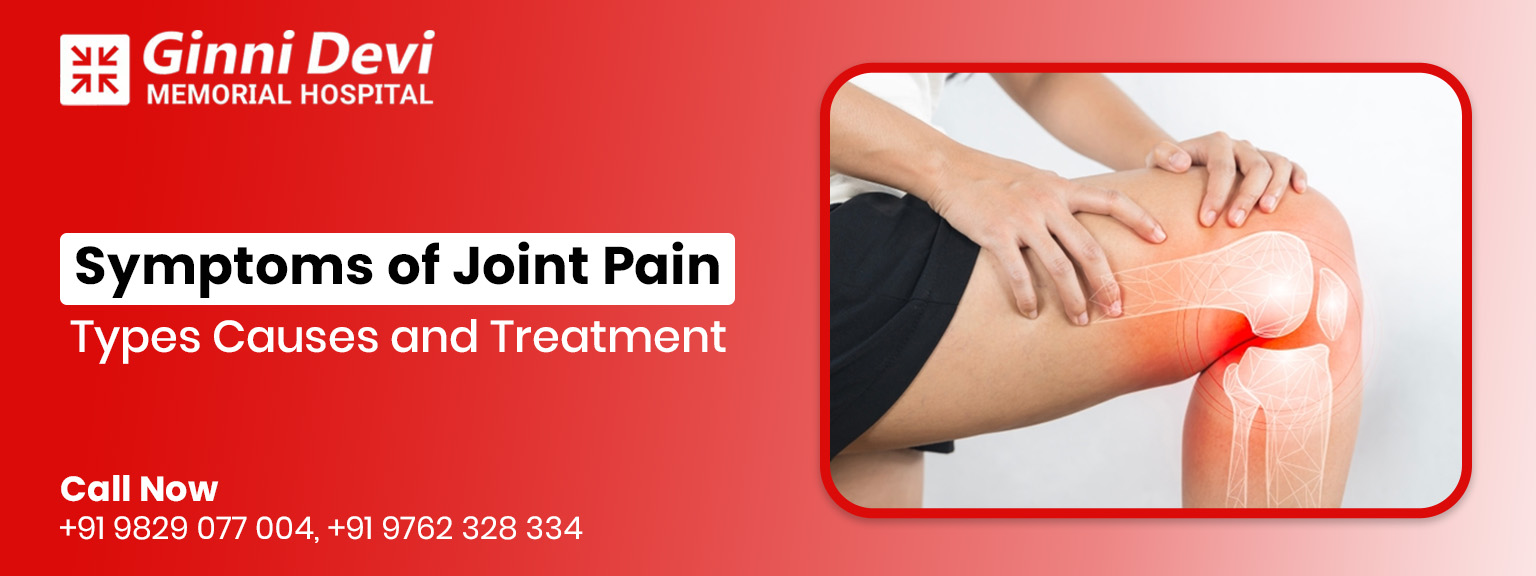Joint pain causes physical distress, which affects people from different age groups. The condition can start as simple soreness but sometimes worsens to create extreme pain, which hinders people from performing their regular activities. Learning about both symptoms of joint pain and its types alongside treatments and root causes allows people to handle the condition better while minimizing additional adverse effects.
Symptoms of Joint Pain
The development of joint pain depends on whether the underlying cause occurs suddenly or develops gradually. Some common symptoms include:
- Swelling and Inflammation: A swollen joint with warmth and pain symptoms is present in the affected area.
- Stiffness: After rest and first thing in the morning, many people face joint stiffness.
- Redness and Tenderness: The joint area will turn red along with becoming sensitive when touched.
- Weakness and Fatigue: The joint weakness prevents patients from performing normal daily operations.
- Limited Range of Motion: Painful limitations and stiffness affect the normal range of motion in a joint.
- Clicking or Popping Sounds: Grinding or clicking sounds can be heard by some individuals during their joint movement.
Types of Joint Pain
Joint pain exists in different forms, which stem from distinct medical conditions. The major categories of joint pain include the following types:
- Osteoarthritis (OA): Wear and tear of cartilage throughout life leads to the degenerative joint disease known as OA. The affected joints most often include knees, hips, hands, and spine.
- Rheumatoid Arthritis (RA): An autoimmune disease that misdirects immune system responses to attack joints, leading to joint inflammation and pain.
- Gout: Joint pain that causes sudden and intense attacks appears mainly in the big toe because of blood uric acid buildup in the body.
- Bursitis: The inflammatory condition of fluid sacs (bursae) mostly results from repeated movements and caused injuries.
- Tendinitis: Active movement or excessive stretching of the body leads to tendon inflammation, especially in elbows, shoulders, and knees.
- Infectious Arthritis: Such infections spread to joints and trigger swelling while generating fever patterns.
Causes of Joint Pain
Multiple conditions cause joint pain, which consists of the following factors:
- Aging: Natural wear and tear of joints over time.
- Injuries: Joint pain together with long-term complications emerges after experiencing fractures or dislocations and accidents.
- Obesity: Body weight overloads joints to produce unhealthful effects mostly on the knees and hips.
- Lack of Physical Activity: The absence of physical activity helps create joint stiffness and weakens body muscles.
- Repetitive Movements: Physical activities along with occupational tasks can cause joint problems when people utilize their joints to excess.
- Medical Conditions: Medical disorders that include lupus together with fibromyalgia and infections frequently result in joint discomfort.
Treatment Options for Joint Pain
Different forms of joint pain treatment require knowledge of their severity along with the identified causes. The most successful treatments available are:
1. Medications
- Both ibuprofen and acetaminophen purchased without a prescription help people experiencing minor joint discomfort.
- Stronger medications alongside corticosteroid injections become treatment options for severe joint pain situations.
2. Physical Therapy
- Stretch and strength exercises executed regularly help people gain flexibility while also decreasing stiffness.
- Physical therapists will generate individualized exercises for improved joint mobility.
3. Lifestyle Modifications
- Maintaining a Healthy Weight: Joints can experience reduced pressure when someone has a normal body weight.
- Balanced Diet: A diet containing calcium, vitamin D, and omega-3 acids protects people’s joint wellness.
- Exercise: Swimming and cycling with yoga create joint-strengthening exercises that minimize strain during the activities.
4. Home Remedies
- Hot and Cold Therapy: Patients can reduce pain and inflammation by applying either hot or cold packs to the affected area.
- Rest and Protection: Limiting activities that intensify joint pain helps stop additional injury from taking place.
- Braces and Supports: Orthotic devices and braces help patients achieve stability alongside comfort.
5. Surgical Treatments
- When non-surgical treatments do not work effectively, patients might need joint replacement surgery. Your choice of the best knee replacement hospital in Jaipur must include medical facilities that have excellent equipment and surgeon professionals.
- A joint replacement surgeon in Jaipur evaluates patient conditions to decide if surgical procedures should become the ultimate solution for enduring pain relief.
When to Visit an Orthopedic Hospital
People who experience chronic joint pain that interferes with their routine activities need to consult with professional medical specialists. The best knee replacement surgeon in Jaipur provides both an accurate diagnosis of the condition and appropriate treatment recommendations. Medical patients who select established orthopedic hospitals in Jaipur gain access to specialized care with modern technologies and complete joint treatment solutions.




